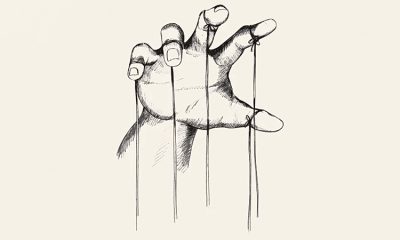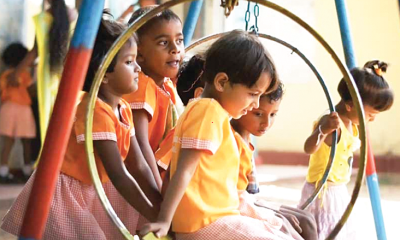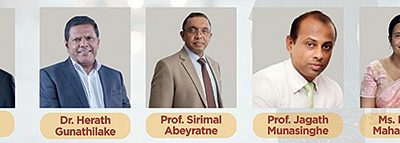Editorial
Procrastination could be killer of economy

Saturday 7th May, 2022
Yesterday’s hartal crippled the country, which needs work stoppages like a hole in the head amidst the worst-ever economic crisis it is facing, for they only put paid to the efforts being made to resuscitate the economy. But the blame for this unfortunate situation should be apportioned to the government, which is playing tricks on the people. What we witnessed yesterday may be considered a foretaste of the worst-case scenario, which is expected to play out, if the government remains intransigent.President Gotabaya Rajapaksa may have thought he would be able to assuage public anger by appointing some relatively young MPs to the Cabinet. The members of the B team, save one or two, have also failed; they are all at sea. It is said that you cannot make a silk purse out of a sow’s ear.If the President continues to dillydally, claiming that he cannot appoint an all-party interim government because the SJB and the JVP are not amenable to such an arrangement, he will only drive the angry protesters to redouble their efforts to oust him. He ought not to ignore the warning issued by trade unions that they will launch a continuous hartal from 11 May unless both he and the government step down forthwith. Backdoor political deals his brothers are busy striking in a desperate bid to retain power and safeguard their family interests will be of little use in case of a protracted hartal. Media reports say President Rajapaksa has finally brought himself to request the Prime Minister to step down. This seems to be the only way he could seek to prevent a further escalation of the crisis.
The Opposition is demanding a general election, but has expressed its willingness to consider joining an interim administration if both the PM and the President step down. It has refused to soften its stance; it would not listen to the religious leaders who are asking for an all-party interim government to resolve the economic crisis urgently and then conduct a general election. The outcome of Wednesday’s ballot in Parliament exposed the Opposition’s real strength; only 65 MPs voted for its candidate for the post of the Deputy Speaker in the 225-member House. Thus, the Opposition cannot secure the passage of the SJB’s no-faith motion against the government under its own steam. It has to enlist the support of the dissident SLPP MPs, who are calling for an interim administration.he current political impasse has taken a heavy toll on the economy. The Opposition should realise that it will not be able to win back popular support by staging protests. The people have rejected all politicians as could be seen from the ‘underwear protest’ at the newly-established Horu Go Home Gama near Parliament. The national legislature has never been ridiculed in this manner, and all the MPs must take the blame for having caused a severe erosion of public faith in Parliament and causing it to lose its dignity. Two branches of government—the Executive and the Legislature—are under siege. What is this world coming to when the President cannot visit his office due to protests, and the MPs are dependent on the riot police to travel to and from Parliament? It is high time both the government and the Opposition realised the danger of provoking the public further. They had better get together and discuss how to resolve the crippling economic crisis. Perhaps, the religious leaders, who have proposed a sensible short-term solution, should consider summoning a meeting of political leaders and knocking some sense into them.
Editorial
Prelates’ wise counsel

Thursday 29th January, 2026
Four Mahanayake Theras have made an intervention, albeit with delay, to reorient government policy towards commonsense and good governance. They have raised concerns about the prolonged delay in appointing the Auditor General. In a letter to President Anura Kumara Dissanayake, they have warned that the continued absence of an Auditor General has created space for various groups to question the state’s financial oversight and fuel debate over public financial management.
Noting that selecting an external officer for a post so central to public audit and oversight could detract from the integrity of the office, the Prelates have voiced support for Dharmapala Gammanpila, a senior official with extensive experience in the National Audit Office, as the most suitable candidate for the post of Auditor General.
The post of Auditor General has remained vacant since the retirement of the former incumbent in April 2025, and three nominations submitted by the President were rejected by the Constitutional Council (CC)––and rightly so. The government is trying to parachute an outsider into the Auditor General’s post to safeguard its interests.
Supermajorities make governments impervious to reason and blind them to reality. Feeding politicians’ autocratic tendencies that are a threat to democracy, steamroller majorities drive governments to embark on risky missions and launch mega projects to boost their leaders’ egos. An SLFP-led government weakened the economy with a disastrous experiment with autarky in the 1970s. A UNP government, elected in 1977, went to the other extreme, ruining profitable state enterprises and institutionalising election malpractices, political violence and corruption. Another SLFP-led government launched a grandiose infrastructure development drive and spent borrowed money on some Ozymandian projects, which have become white elephants. An SLPP administration introduced an ill-planned organic farming drive. The incumbent government has undertaken to reform the education system hastily.
The Dissanayake government is bent on reducing every vital state institution to a mere appendage of the JVP in a bid to perpetuate its hold on power. The Police Department has already become a pliable tool of the JVP. The CID is now a part of the JVP in all but name; it is doing political work for the government. It arrests, harasses and casts aspersions on the political rivals of the government in the name of investigations. Whenever the government paints itself into a corner, the CID makes some high-profile arrests to divert attention. The ruling party propagandists have launched a vilification campaign against the Attorney General, with the JVP/NPP supporters holding protests and calling for his ouster, as part of a government strategy to render the state prosecutor malleable so that the JVP/NPP can have its rivals arrested and prosecuted according to its whims and fancies.
The powerful message in the Mahanayake Theras’ letter to President Dissanayake has resonated with the public, who cherish democracy and good governance. It is being argued in some quarters that going by what Cabinet Spokesman and Minister Dr. Nalinda Jayatissa said about the prelates’ letter, at this week’s post-Cabinet media briefing, the government is likely to go ahead with its plan to appoint an outsider as Auditor General, paying no heed to the Mahanayake Theras’ concerns.
The JVP/NPP is not alone in ignoring the Mahanayake Theras’ concerns and advice. In December 2011, the Mahanayake Theras of the Asgiriya and Malwatte Chapters of Siam Nikaya, the Ramanna Nikaya and the Amarapura Nikaya, intervened to resolve a dispute in the UNP. They wrote to UNP leader Ranil Wickremesinghe, urging him to appoint Karu Jayasuriya as UNP leader, and thereby help strengthen the Opposition. Their letter went unheeded. One of the allegations the JVP and other Opposition parties levelled against President Mahinda Rajapaksa in 2014 was that his sons had held a car race in Kandy, ignoring the Mahanayake Thera’s concerns and protests.
It will be interesting to see whether President Dissanayake considers the prelates’ wise counsel seriously and abandons his efforts to politicise the National Audit Office.
Editorial
Hubris and downfall

Wednesday 28th Junuary, 2026
The SJB-led Opposition made a public display of collecting signatures for a no-confidence motion (NCM) against Prime Minister and Education Minister Dr. Harini Amarasuriya over the government’s flawed educational reforms, but it has since got cold feet. Not all Opposition parties have endorsed the NCM in question. Some bigwigs of the JVP/NPP government with a two-thirds majority are now daring the Opposition to go ahead with the NCM. Dr. Amarasuriya herself has taunted the Opposition, in Parliament, asking why it has baulked at moving the NCM against her.
The government is humiliating trade unions as well. Deputy Health Minister Dr. Hansaka Wijemuni has scoffed at the strength of the Government Medical Officers Association, which is currently on the warpath. He has claimed that the doctors did their utmost to win their demands by holding patients to ransom, but in vain, and warned that the government will not hesitate to take stern action to keep the state-run hospitals free from disruptions. This warning smacks of a veiled threat.
The JVP/NPP high-ups are sounding just like their predecessors, especially the members of the UNP regime led by President J. R. Jayewardene. The incumbent government’s dire warning to the protesting doctors reminds us of how the JRJ government suppressed trade union struggles in the 1980s. Having crushed the July 1980 general strike by terminating tens of thousands of workers who took part in it, the Jayewardene government bragged that ‘the elephant’ (meaning the UNP) had only shaken its trunk.
As for the Opposition’s NCM on hold, it is hoped that the JVP/NPP government will not follow a very bad precedent set by the Jayewardene regime. In 1980, the Opposition sought to postpone the debate on an NCM it moved against the then Speaker Bakeer Markar for backing President Jayewardene’s efforts to retain Abeyratne Pilapitiya as a UNP MP by nominating him to the Kalawana electorate despite a Supreme Court ruling that his election was void. Speaker Markar echoed President Jayewardene’s assertion that the Kalawana seat had not fallen vacant, and therefore a by-election was not warranted. The NCM against the Speaker was scheduled to be debated on 23 December, 1980, but the Opposition wanted it postponed in view of possible legal implications of the by-election the UNP was trying to avoid. But claiming that the NCM, moved by the Opposition, was of utmost national importance and therefore had to be debated urgently, the UNP government took it up, put it to the vote and defeated it! All UNP MPs, including the proposer and the seconder, voted against the NCM! The Opposition boycotted the NCM debate.
When the JVP-NPP government dares the Opposition to move the NCM against Prime Minister Amarasuriya, it sounds like its immediate predecessor, the SLPP-UNP administration, which was led by Jayewardene’s nephew, President Ranil Wickremesinghe. One may recall that when the Opposition, including the JVP, demanded action against the then Health Minister Keheliya Rambukwella over a racket involving the procurement of a fake cancer drug, President Wickremesinghe audaciously challenged it to move an NCM against Rambukwella. The Opposition did so, but the SLPP and the UNP defeated the NCM comfortably. Wickremesinghe apparently thought the matter would end there, but he was mistaken.
A government may defeat an NCM and boast of victory, but allegations against its members do not go away. The SLPP-UNP government could not go on defending Rambukwella, who was eventually thrown to the wolves. A parliamentary majority does not necessarily translate into a government’s ability to win elections. The crumbling SLPP-UNP regime, which defeated the NCM against Rambukwella, faced ignominious defeats in the presidential and parliamentary elections in 2024. The Yahapalana government (2015-2019) also had a parliamentary majority despite the UPFA’s pull-out from it in October 2018; the then Prime Minister Ranil Wickremesinghe retained his hold on power with the help of the JVP, the TNA, etc., but his party, the UNP, was reduced to a single National List seat in the 2020 general election. The JVP, which threw its weight behind Wickremesinghe, could secure only three seats.
Governments with supermajorities, too, have suffered crushing electoral defeats in Sri Lanka. The SLFP-led United Front government, which had a two-thirds majority, suffered a Humpty Dumpty-like fall in 1977. President Mahinda Rajapaksa’s government secured a two-thirds majority but collapsed like a house of cards in 2015. So did the Gotabaya Rajapaksa administration, which also had a two-thirds majority. The JVP-NPP government is ruining things for itself so much so that it is wary of holding the Provincial Council elections. Powerful governments in this country apparently tend to dig their own political graves.
Editorial
President’s Pension

Tuesday 27th January, 2026
The NPP government’s efforts to abolish MPs’ pensions have met with stiff resistance. All members of the current Parliament, including 159 NPP legislators, will lose their retirement benefits unless the government walks back its plan. Several petitions have been filed before the Supreme Court against the bill seeking to abolish the MPs’ pension scheme. The matter is now best left to the judges of the apex court.
Interestingly, former Minister of Justice Dr. Wijeyadasa Rajapakshe has pointed out that President Anura Kumara Dissanayake, who is all out to do away with MPs’ pensions, will receive his retirement benefits.
What one gathers from Dr. Rajapakshe’s argument is that President Dissanayake, like his predecessors, will be entitled to his pension. Article 36 of the Constitution says: “Within one month of the commencement of the Constitution, Parliament shall by resolution determine the salary, allowances and pension entitlement of the holders of the office of President. Such pension shall be in addition to any other pension to which such person is entitled by virtue of any prior service” (emphasis added). Article 36 (2) says, inter alia, “Any subsequent amendment, repeal or replacement of this Article and any subsequent law or any provision thereof inconsistent with this Article shall not have retrospective operation.” Article 36 (4) says: “Parliament may by resolution increase, but shall not reduce, the salary, allowances or pension entitlement of the holders of the office of President.”
One may recall that before the 2024 elections, the JVP/NPP leaders had the public believe that they would practise austerity a la Jose Mujica, who was the President of Uruguay from 2010 to 2015. Known as the world’s poorest President, Mujica, refused to move into the President’s House, and lived on a farm with his wife; his most notable asset was a 1987 Volkswagen Beetle. He donated his presidential salary and waited in queues with ordinary people in government hospitals, where he received treatment. He died a few months ago. It is unbecoming of the self-proclaimed Marxist leaders who denounced the previous Presidents for using insanely expensive vehicles purchased with state funds. In 2018, Dissanayake, as an Opposition MP, made a hue and cry about two bulletproof vehicles bought for the then Prime Minister Ranil Wickremesinghe’s use, at a staggering cost of Rs. 300 million each. He condemned that kind of expenditure as an utter waste of state funds. Now, the 600-million-rupee question is where those vehicles are. Are the incumbent government leaders using them?
Shouldn’t President Dissanayake emulate Mujica instead of his predecessors whom he berated for wasting tax money to maintain fleets of super luxury vehicles and large VVIP security divisions?
Meanwhile, it is puzzling why the JVP/NPP has not sought to abolish the MPs’ salaries as well. The JVP says it looks after its leaders and parliamentary group members. Besides, as evident from their asset declarations, they can easily do without their salaries. They should heed what Mujica famously said in an interview with BBC: “I’m called ‘the poorest president’, but I don’t feel poor. Poor people are those who only work to try to keep an expensive lifestyle, and always want more and more.” Sadly, as we argued in a previous comment, the only similarity one sees between the policies of the Mujica administration and those of the JVP-led NPP government is their lax attitude towards cannabis. Mujica legalised the recreational use of cannabis, and the JVP/NPP leaders have permitted the cultivation of cannabis for export.
While claiming that their well-wishers look after them, the JVP/NPP leaders insist that their political rivals in the current Parliament amassed huge amounts of ill-gotten wealth while they were in power. In fact, those who are currently in the Opposition enriched themselves while savouring power and now spend colossal amounts of funds on their election campaigns and live in clover. So, one can argue that the members on both sides of the House are in a position to serve the nation voluntarily.
-

 Business4 days ago
Business4 days agoComBank, UnionPay launch SplendorPlus Card for travelers to China
-

 Business5 days ago
Business5 days agoComBank advances ForwardTogether agenda with event on sustainable business transformation
-

 Opinion5 days ago
Opinion5 days agoConference “Microfinance and Credit Regulatory Authority Bill: Neither Here, Nor There”
-

 Opinion7 days ago
Opinion7 days agoA puppet show?
-

 Opinion4 days ago
Opinion4 days agoLuck knocks at your door every day
-

 Business6 days ago
Business6 days agoDialog Brings the ICC Men’s T20 Cricket World Cup 2026 Closer to Sri Lankans
-

 Features7 days ago
Features7 days ago‘Building Blocks’ of early childhood education: Some reflections
-

 News5 days ago
News5 days agoRising climate risks and poverty in focus at CEPA policy panel tomorrow at Open University













